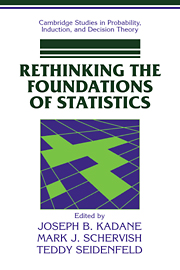Book contents
- Frontmatter
- Contents
- Introduction
- PART 1 DECISION THEORY FOR COOPERATIVE DECISION MAKING
- PART 2 THE TRUTH ABOUT CONSEQUENCES
- 2.1 Separating Probability Elicitation from Utilities
- 2.2 State-dependent Utilities
- 2.3 Shared Preferences and State-dependent Utilities
- 2.4 A Conflict Between Finite Additivity and Avoiding Dutch Book
- 2.5 Statistical Implications of Finitely Additive Probability
- PART 3 NON-COOPERATIVE DECISION MAKING, INFERENCE, AND LEARNING WITH SHARED EVIDENCE
- Index of Names
- Subject Index
2.3 - Shared Preferences and State-dependent Utilities
Published online by Cambridge University Press: 05 June 2012
- Frontmatter
- Contents
- Introduction
- PART 1 DECISION THEORY FOR COOPERATIVE DECISION MAKING
- PART 2 THE TRUTH ABOUT CONSEQUENCES
- 2.1 Separating Probability Elicitation from Utilities
- 2.2 State-dependent Utilities
- 2.3 Shared Preferences and State-dependent Utilities
- 2.4 A Conflict Between Finite Additivity and Avoiding Dutch Book
- 2.5 Statistical Implications of Finitely Additive Probability
- PART 3 NON-COOPERATIVE DECISION MAKING, INFERENCE, AND LEARNING WITH SHARED EVIDENCE
- Index of Names
- Subject Index
Summary
ABSTRACT
This investigation combines two questions for expected utility theory:
When do the shared preferences among expected utility maximizers conform to the dictates of expected utility?
What is the impact on expected utility theory of allowing preferences for prizes to be state-dependent?
Our principal conclusion (Theorem 4) establishes very restrictive necessary and sufficient conditions for the existence of a Pareto, Bayesian compromise of preferences between two Bayesian agents, even when utilities are permitted to be state-dependent and identifiable. This finding extends our earlier result (Theorem 2, 1989a), which applies provided that all utilities are stateindependent. A subsidiary theme is a decision theoretic analysis of common rules for “pooling” expert probabilities.
Against the backdrop of “horse lottery” theory (Anscombe and Aumann 1963) and subject to a weak Pareto rule, we show, generally, that there is no Bayesian compromise between two Bayesian agents even when state-dependent utilities are entertained in an identifiable way. The word “identifiable” is important because if state-dependence is permitted merely by dropping the Anscombe-Aumann axiom (Axiom 4 here) for “state-independence,” though a continuum of possible Bayesian compromises emerges, also it leads to an extreme underdetermination of an agent's personal probability and utility given the agent's preferences. Instead, when state-dependence is monitored through (our version of) the approach of Kami, Schmeidler, and Vind (1983), the general impossibility of a Bayesian, Pareto compromise in preferences reappears.
- Type
- Chapter
- Information
- Rethinking the Foundations of Statistics , pp. 169 - 193Publisher: Cambridge University PressPrint publication year: 1999

